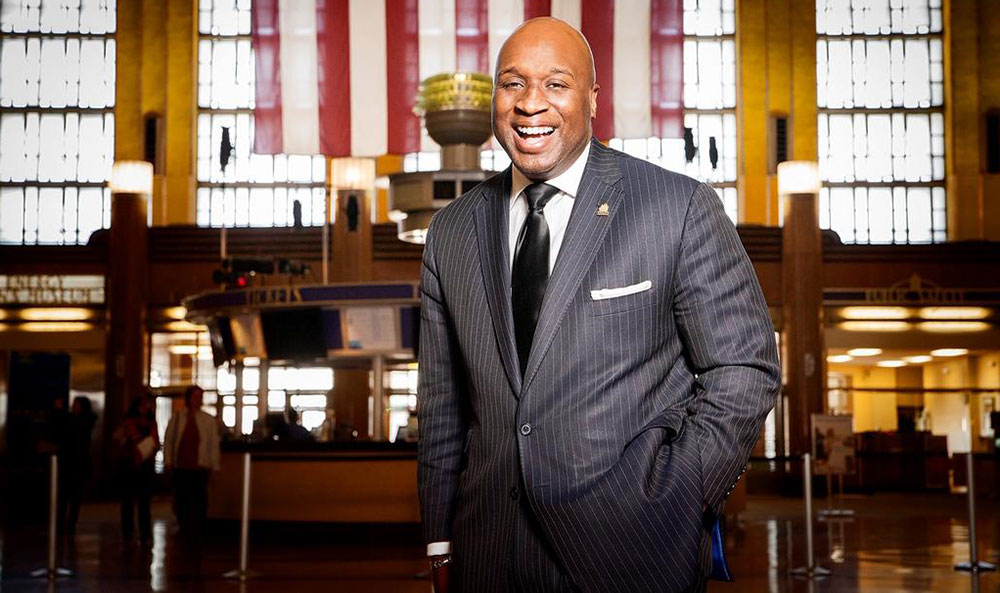
Jason Dunn, group vice president of diversity sales and inclusion at the Cincinnati USA Convention and Visitors Bureau, has been named board chairman for the National Coalition of Black Meeting Professionals. (Courtesy of Cincinnati USA Convention and Visitors Bureau)
In November, the National Coalition of Black Meeting Professionals (NCBMP), formerly known as the National Coalition of Black Meeting Planners, began making good on its new name by electing a board chairman who is not a meeting planner for the first time in the organization’s nearly 40-year history. Jason Dunn, group vice president of diversity sales and inclusion at the Cincinnati USA Convention & Visitors Bureau, was elected as the new Chairman of the Board for the coalition — made up of 1,000 members — during the 36th Annual NCBMP Convention in New Orleans last November.
In his role with the Cincinnati USA CVB, Dunn does more than sell to diverse groups. Dunn and his team connect organizations holding events in the city with local groups and businesses that reflect their mission and represent the visiting community. Dunn also works with Cincinnati Public Schools and local universities to create hospitality programs that introduce the industry to students at a young age. “Data shows people of color want to see persons who look like them in the industry,” Dunn said. “Most people believe that hospitality [roles as they relate] to people of color are limited to cooking and cleaning. However, we want to show them that there’s more opportunity and professional development pathways within the industry.”
Dunn recently spoke with Convene to talk more about his new role and the state of diversity and inclusion within the meetings industry.
As the first chair of the NCBMP who is not a meeting planner, what do you plan to bring to the role that is unique?
The history of the organization is rooted in the idea of equity. Black convention planners assembled 37 years ago to ensure that destinations that hosted their meetings had professional representation of color. Our members represent the first of many industry leadership roles. We have members who are and were the first African American presidents, chairpersons, executive directors and vice presidents who would not have had the opportunities if NCBMP did not exist. In continuation of the progress we have made over the last 37 years, the question now is: ‘How do we elevate the conversation to heighten our impact?’ The premise of the organization at its core is, “We’re spending money in cities, but they must respect and reflect a diverse community.”
Now as we broaden the scope of focusing on all professionals, African Americans and persons of color can be GMs of hotels, CFOs, marketing [executives], sales managers, etc. The broader name allows the organization to expand to all professionals of color who are in this industry, with a heightened interest on African Americans. It is reflective of the broadening of the organizations mission. The growth of our organization, community and industry are proof points that diversity is not an afterthought. The equity conversation is genuine and it shows that cities really want to be diverse. Not because they have to — it’s just good business and the right thing to do.
There are intersections between my role as GVP in Cincinnati and Chairman of NCBMP. I want to ensure our members have the opportunity to access education. It’s one thing to have equity in titles, but we have to empower our members to access education which supports their authority. The objective is to ensure equal access to professional development opportunities within the industry. We are investing in our future by working with colleges and universities that have hospitality programs to expose them to opportunities outside of the stereotypical service roles. While there are plenty of success stories of our executives flourishing on all levels, it is important to introduce our students to the C-Suite opportunities as well. Lastly, it is very important to me that we empower our members to support cities that support diversity in a thoughtful way.
What do you think the greatest challenge is for the meetings industry in terms of diversity and inclusion?
I think the biggest challenge is dual understanding — there are different strategies that come with [selling to] different market segments, however, we’re all working towards a common goal. Another key opportunity to overcome is the alignment of leadership and middle management creating strategies that are reflective of the changing demographics within the industry.
In other words, we have to allow ourselves to be uncomfortable in order to have an authentic conversation. In the past, persons of color may not have been in the room when decisions were made and strategies discussed, now that people of color are in the room, there may be some sense of fear…. But I think this has created an equity conversation and [shows] … that we all grow together as this country becomes more diverse; and it’s good for the industry if we broaden and strengthen our roles by coming together in a comprehensive way.
Casey Gale is a Convene associate editor.
